You should never be content just to fulfil your duty but should do more than that, you should voluntarily accept a task which people do not expect you to do but which you should do for love.... only then will you be lovingly active and only this effort will be valued and bring you blessings for eternity. People who dutifully carry out their earthly work believe themselves to have done enough. In that case their life is in fact a life of fulfilment of duty but nevertheless it is not a conscious service of love.... Whatever a duty demands to be done invariably corresponds to worldly objectives. Anything that has a refining influence on the soul will neither be demanded nor carried out as a duty but it always has to be done in absolute freedom of will, and this is why a soul's progress can only be spoken of when the person works above and beyond his duty and will not stop such kind-hearted activity.
However, anything the human being accepts for himself or imposes on others as an obligation only has earthly value, since neighbourly love need not necessarily be the driving force of fulfilling a duty. There are, as a rule, human laws which intend to uphold worldly order, the fulfilment of which are therefore effectively necessary in order to combat people's weak will, for many people would not carry out what they are duty-bound to do if a sense of duty had not been cultivated in them. Everything they do is thus somehow or other conditional and results in some kind of earthly benefit. An earthly way of life which only shows an endless string of deeds, all of which fit into the category of fulfilment of duty, by no means have to result in a psychological state of maturity, for precisely this fulfilment of duty prevents people from being truly lovingly active.
Although the fulfilment of duty cannot be portrayed to people as wrong or unnecessary, it nevertheless poses a certain danger for the human being's soul, for the more he uses it as a guiding principle of human life, the more significance he attaches to precisely this duty and the more he believes himself to be exempt from true activities of love, for he deems his time sufficiently used and yet spiritually he stays behind if he fails to love, i.e., despite being fully occupied by duties, he is not urged by love to do 'more'.... to help his fellow human beings both spiritually and physically with deeds which are never demanded by people and therefore love can never become a duty either. Fulfilment of duty on its own certainly ought to be recognised in an earthly way but it is of no importance for eternity, thus the human being must do his utmost and try to be helpful of his own free will. He should not be content with fulfilling his duty but of his own accord do 'more'.... he should give and help with love, so that his soul will find salvation, which only ever benefits from what the human being does of his own free will and in selfless neighbourly love....
Amen
This proclamation is used in the following themebook:
| Themebook | Title | Download |
|---|---|---|
| 7 | Love - The Highest Commandment |
|













